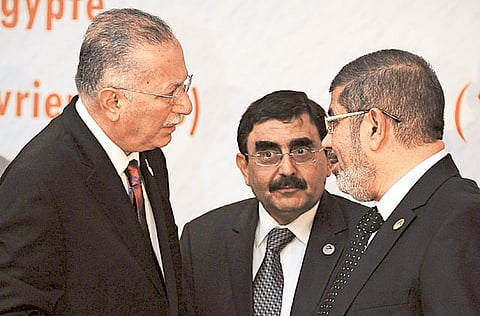Egypt opposition leader warns over death edict
Fatwa causes alarm after Tunisia opposition leader critical of government is killed

Cairo: Egypt’s most prominent opposition leader criticised the Islamist government on Wednesday for its silence over a Muslim cleric’s edict calling for the death of opposition supporters.
Mohammad Al Baradei was responding to well-known ultraconservative cleric Mahmoud Shaaban, who said in a TV show last week that the opposition should be punished by death for seeking to bring down a leader who has been elected by the public.
“God’s verdict is death,” he said amid a new wave of protests against Islamist President Mohammad Mursi.
The fatwa, or religious edict, followed another one by hardline cleric Magdi Goneim who said: “I publicly incite to kill the thugs, criminals, thieves, and those who burn the country and kill the innocents.”
Al Baradei lamented the edicts in a message posted on his Twitter account.
“Regime silent as another fatwa gives license to kill opposition in the name of Islam,” he said, adding: “Religion yet again used and abused.”
The edicts caused alarm in Egypt after a Tunisian opposition leader critical of the Islamist-led government there was assassinated on Wednesday.
Tunisia was the first Arab country to witness a mass uprising and Egyptians watch Tunisia for cues on the direction their own country might take.
At the same time, Mursi’s office accused the opposition on Wednesday of benefiting from the recent wave of violence that left more than 70 people dead. Yasser Ali, Mursi’s spokesman, told reporters that the opposition was using the clashes “as a means of political pressure.”
Egypt has been engulfed in riots and protests over the past two weeks.
The mostly liberal opposition and a large sector of moderate Muslims are demanding Mursi amend the constitution, which was passed hurriedly by an Islamist-led constituent assembly and approved in a referendum despite vigorous opposition objections.
Egypt’s powerful military has warned recently of the “collapse” of the state in the midst of political fragmentation.
Criticism of Mursi’s administration has mounted lately after a string of violent sexual assaults on female protesters in Cairo’s Tahrir Square. On Wednesday, an international rights group warned mob-led sexual assaults will only increase if perpetrators are not punished.
Amnesty International said statements from victims show that the assaults follow a “clear pattern” where mobs of men encircle the victims, assault them with weapons and hands and then try to undress them.
Amnesty’s warning followed a statement from the UN human rights office, which last week said that about 25 women were reportedly sexually assaulted — in some cases with extraordinary violence — in Tahrir Square during recent demonstrations against Mursi.
The square witnessed a number of assaults against women — both protesters and journalists — in the aftermath of the uprising. Women have been stripped, groped and raped at demonstrations there.
The UN agency demanded that Egyptian authorities take steps to bring the perpetrators to justice. Amnesty also urged prompt action.
“Horrific, violent attacks on women, including rape in the vicinity of Tahrir Square, demonstrate that it’s now crucial President Mursi takes drastic steps to end this culture of impunity and gender-based discrimination,” said Hassiba Hadj Sahraoui of the London-based group.
Amnesty cited a report by a local anti-harassment group, which said that a total of 19 violent attacks against women took place on January 25 alone — the day Egyptians staged a huge demonstration in Cairo to mark the second anniversary of the uprising that ousted authoritarian leader Hosni Mubarak.
Activists have called the incidents the worst in years, describing them as the darkest stain on the country’s opposition street movement.
One particular attack on a woman on January 25 has stood out: A mob of men in Tahrir Square raped a 19-year-old woman with a sharp object, cutting her genitals in an attack that forced her to undergo emergency surgery.
Some 2,000 people rallied in downtown Cairo on Wednesday, protesting against the failure of Mursi’s government to protect women demonstrators. Some at the rally raised banners reading: “Those silent against the harassers are devils.”
In other developments, the official news agency said the country’s top appeals court has granted retrials for two senior officials from the Mubarak regime.
Mena says the court threw out guilty verdicts for Mubarak’s chief-of-staff, Zakariya Azmi, and former Agriculture Minister Amin Abaza. They were charged with illegally acquiring and concealing gains from real estate deals.
Several Mubarak-era officials face retrials after their verdicts were overthrown — a development that puts the spotlight in Egypt back on the highly divisive issue of justice for former regime members, two years after the uprising.
Mubarak’s own life sentence on a conviction of failing to prevent the killing of hundreds of protesters has been overturned and he is to be re-tried along with his top security officers.
Sign up for the Daily Briefing
Get the latest news and updates straight to your inbox

